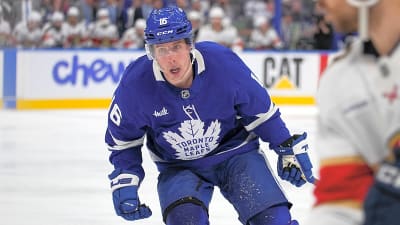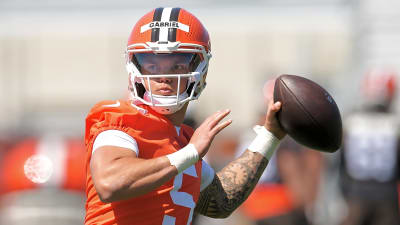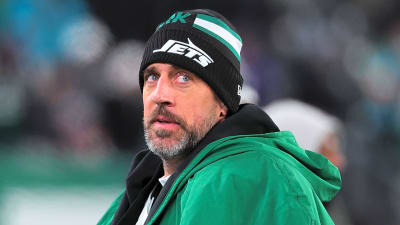
Over the last half-decade, Alex Anthopoulos and the Braves have handed out more than $773,000,000 in contract extensions, and it’s become increasingly concerning that the Braves might have paid the wrong players.
Some folks around the league lauded Anthopoulos and Atlanta for locking up young players at team-friendly rates. Others quipped that the club was taking advantage of these players, but what they all failed to acknowledge was the risk associated with these contracts, and now, we’re seeing it come full circle.
Let’s get some of these contract extensions out of the way. Even with the ACL injuries, Ronald Acuna Jr.‘s $100 million extension is still one of the best bargains in baseball. Unlike in 2022, Acuna has returned to form immediately after his second ACL injury. The 2024 MVP is sporting an OPS north of 1.000, thanks to a .333 batting average with four homers in just 12 games.
Chris Sale‘s $38 million extension is also a bargain. Not only did he win the National League Triple Crown en route to his first Cy Young in his first season in Atlanta, but the Braves ace has found his form again in 2025. He boasts a 2.93 ERA on the season and owns a 1.43 ERA across his last eight starts.
But that’s where the unquestioned successful extensions end. The following players signed extensions with the Braves over the last half-decade or so: Austin Riley, Matt Olson, Spencer Strider, Sean Murphy, Michael Harris II, and Ozzie Albies.
These all fall into individual categories because some have been injured, which explains underperformance. Others have been better than average MLB players but aren’t living up to their contracts, and then there are a couple of guys that are just simply underperforming in general.
Austin Riley (10 years, $212 million)
Riley and the Braves agreed to a 10-year, $212 million contract on August 1st in 2022, amid the slugger’s best season as a pro. He finished with a 141 OPS+, thanks to 38 home runs and 39 doubles, both career marks. It culminated in a sixth-place finish in the MVP voting.
It looked like the Braves had just found the next cornerstone of their franchise, and the 2023 campaign affirmed those feelings. Even if Riley’s numbers dipped, it was marginal. He still blasted 37 homers and 32 doubles, good for an OPS+ of 130, and once again finished in the top seven of the MVP voting.
Riley had basically became a lock to hit 35+ home runs, 30+ doubles, 90+ RBIs, record more than 6.0 WAR, and finish in the top 10 of the MVP voting. Or so we thought.
Riley’s 2024 campaign was cut short, but he finished with his lowest batting average, OPS+, and slugging percentage since becoming a full-time starter. The hope was that those struggles were just a part of the Braves’ 2024 season from hell. That hasn’t been the case. Through 56 games, Riley has an OPS+ that is 16% above the league average, but that’s not what you’re expecting from the highest-paid player for one of the most storied franchises in MLB history.
Austin Riley isn’t playing badly, per se; however, he’s not playing like the highest-paid player in franchise history, or anything remotely close to it. That’s what is important in this article: players living up to the contracts they signed, and Austin Riley isn’t doing that. He’s got an OPS+ that is only 13% above league average, compared to 35% from 2021 to 2023. The track record suggests that Riley will eventually get scorching hot, but concerned fans have an argument, especially with him shrinking in the biggest moments of the game.
Matt Olson (8 years, $168 million)
2023 is beginning to look like quite the outlier for Matt Olson. That season, he finished with a .283 average and a franchise-record 54 home runs, culminating in an OPS +that was 64% above league average and a 4th place finish in the MVP vote. In his other three seasons, including this year, Olson sports an OPS+ that is around 16% above league average with a batting average just above .240.
Perhaps that’s just the player he is, but he’ll always be compared to Freddie Freeman. Regardless, if it’s fair or not, Braves Country will always compare Matt Olson to the guy he replaced, and Alex Anthopoulos knew that when he made the trade and subsequent contract offer. To this point, Olson has finished three of his four total seasons in Atlanta with an OPS below his career average. That’s not good enough, especially when you consider what Freddie Freeman is doing in Los Angeles for the Dodgers.
Spencer Strider (6 years, $75 million)
Spencer Strider’s struggles are another thing I’ve talked about, particularly Alex Anthopoulos’ decision to essentially replace Max Fried in the rotation with Strider.
“We’ve lost free agents, no doubt about it, but we have some people we are going to give opportunities to,” Anthopoulos sai6d. “Strider and Fried are not the same, but we lost Strider for last year, and we had the best ERA in the game, and we lost Fried now but Strider comes back. We lose Charlie Morton, can Grant Holmes take that opportunity and be that guy? We think he’s certainly got a chance to do that.”
Where Anthopoulos missed was expecting Strider to replace Fried’s production. The new Yankees ace is thriving in pinstripes atop the Cy Young conversation with a 1.92 ERA. Granted, Fried wasn’t pitching like this in 2024 for the Braves. He finished with an uncharacteristically high 3.25 ERA; however, it’s still far better than what Strider is giving Atlanta.
Spencer Strider came into last night’s contest against the Diamondbacks sporting a 4.50 ERA, and it only got worse. He went 5.0 innings but surrendered five earned runs, three of which came on home runs. It raised his season ERA to 5.68, but even more concerning is the stuff.
Strider sat around 95 mph on his heater, and he still lacked control. Now, he might regain his form eventually, but it looks increasingly possible that it might not happen in 2025. Fried’s contract is also eight years long, so making sweeping statements would be a bit overzealous.
However, it’s a gross oversight on Alex Anthopoulos’ part to assume that Spencer Strider, coming off InternalBrace surgery, could just step in and replace Max Fried. A decision that could end up costing the Braves a spot in the postseason.
Strider’s UCL injury isn’t something that Alex Anthopoulos could’ve foreseen, but the Braves knew the risk associated with paying a starting pitcher, which is why they chose to pay Strider early rather than Max Fried late. It’s also possible that the righty eventually builds back up and reminds everyone why the Braves gave him that contract extension in the first place. Still, if Strider cannot regain his velocity, it’s possible he never returns to form, making that contract look much different.
Sean Murphy (6 years, $73 million)
Sean Murphy is in a conversation of his own. He’s not been bad by any means, even with a career-worst 2024 campaign. The Braves’ All-Star backstop burst onto the scene in his first season with Atlanta, finishing with an OPS+ that was 27% above league average.
Then, the 2024 season began with an oblique strain that forced him to miss two months of the season. When he returned, the Braves’ offense was so bad that Brian Snitker couldn’t get Murphy regular at-bats because Travis d’Arnaud was more productive. The lack of regular playing time and injury hampered Murphy.
It caused some Braves fans to call Murphy’s contract a wart on Anthopoulos’ resume, but Murphy has put those concerns to bed in 2025. He owns an OPS+ that is 22% above league average and is reminding everyone why he’s a top 10 catcher in the game. So, why would he be included in this piece?
Murphy isn’t underperforming relative to his contract, but the Braves have had plenty of backstops on much friendlier contracts like William Contreras before the trade and now Drake Baldwin. That money could’ve been allocated elsewhere, like at shortstop or on the pitching staff.
Michael Harris II (8 years, $72 million)
Michael Harris is in a similar boat to Austin Riley. The track record suggests that his struggles will come to end. However, unlike Riley, Harris has been much worse.
Money Mike is sporting an ugly 63 OPS+ this season. That equates to 37% below league average. For comparison, the Braves center fielder boasted an OPS+ that was 16% above league average in his first three seasons. So, it’s fair to question if these are long-term struggles, or if he will revert back to the All-Star caliber player he was when he first arrived in the majors.
Ozzie Albies (7 years, $35 million)
Once lauded as the most team-friendly deal in baseball, it has turned into one some Braves fans would love to get rid of. Albies is also in a category of his own, where even if he’s slightly underperforming compared to his career averages, his price tag makes up for it.
Albies came into the season with an OPS+ that was about 10% above league average, but he’s currently sporting one that is 18% below league average. Albies has certainly been worth a $35 million extension, especially considering it ends in 2027. So, even if he is falling off, which I don’t think he is, the Braves won’t be on the hook for much longer.
It’s evident now that none of these contract extensions were ever risk-free, because those simply don’t exist in professional sports. And with the Braves in a full-blown free fall, it’s more than fair to question whether the decision to let franchise cornerstones like Freddie Freeman, Dansby Swanson, and Max Fried walk — opting instead to commit long-term money to players like Austin Riley, Matt Olson, and others — was the right one. Right now, Alex Anthopoulos’ grand plan looks like it’s backfiring.
More must-reads:
- Diamondbacks get brutal injury news on ace Corbin Burnes
- Guardians ace faces obstacle in rehab process
- The 'MLB Live-Ball Era strikeout leaders' quiz
Breaking News
Trending News
Customize Your Newsletter
 +
+
Get the latest news and rumors, customized to your favorite sports and teams. Emailed daily. Always free!








